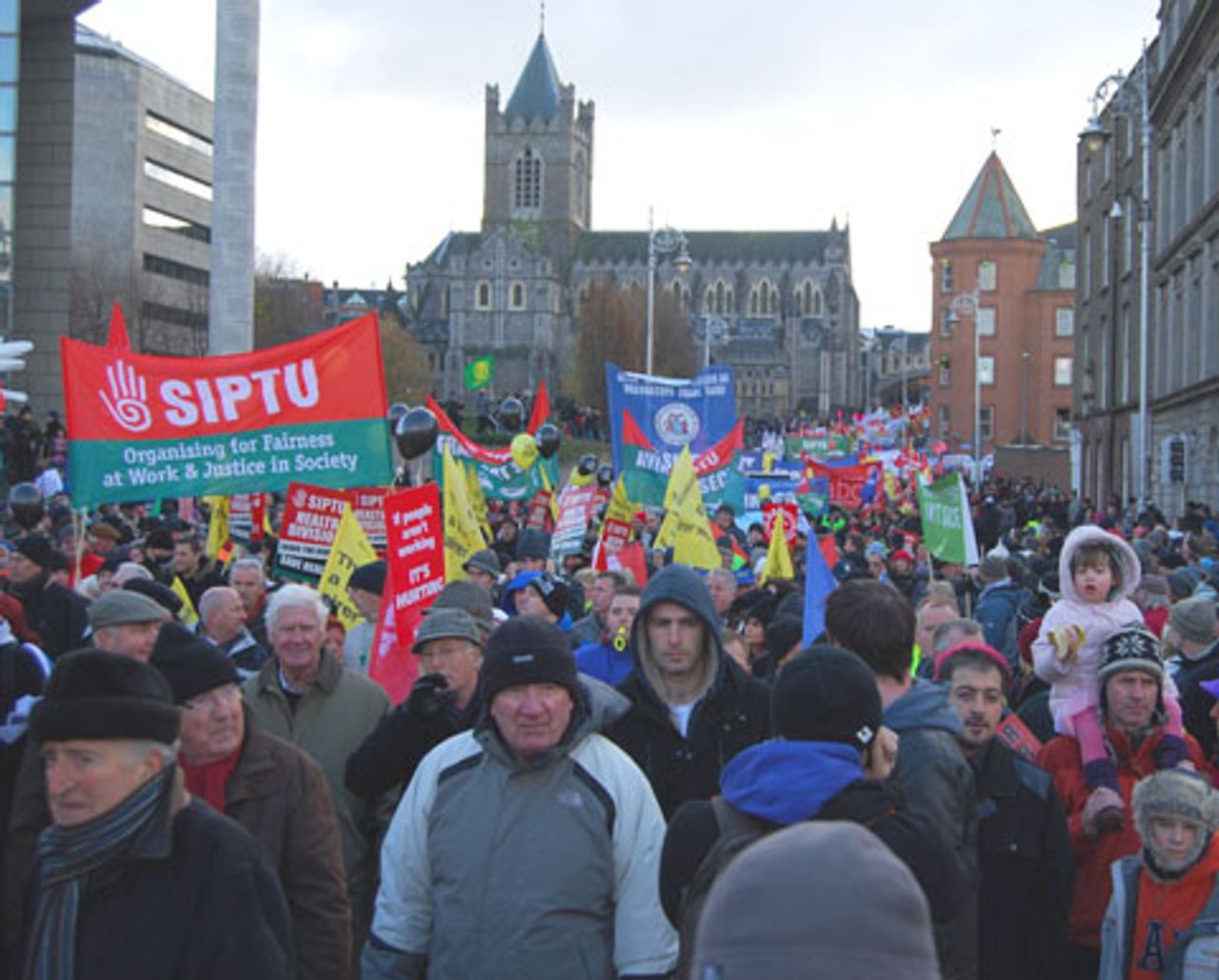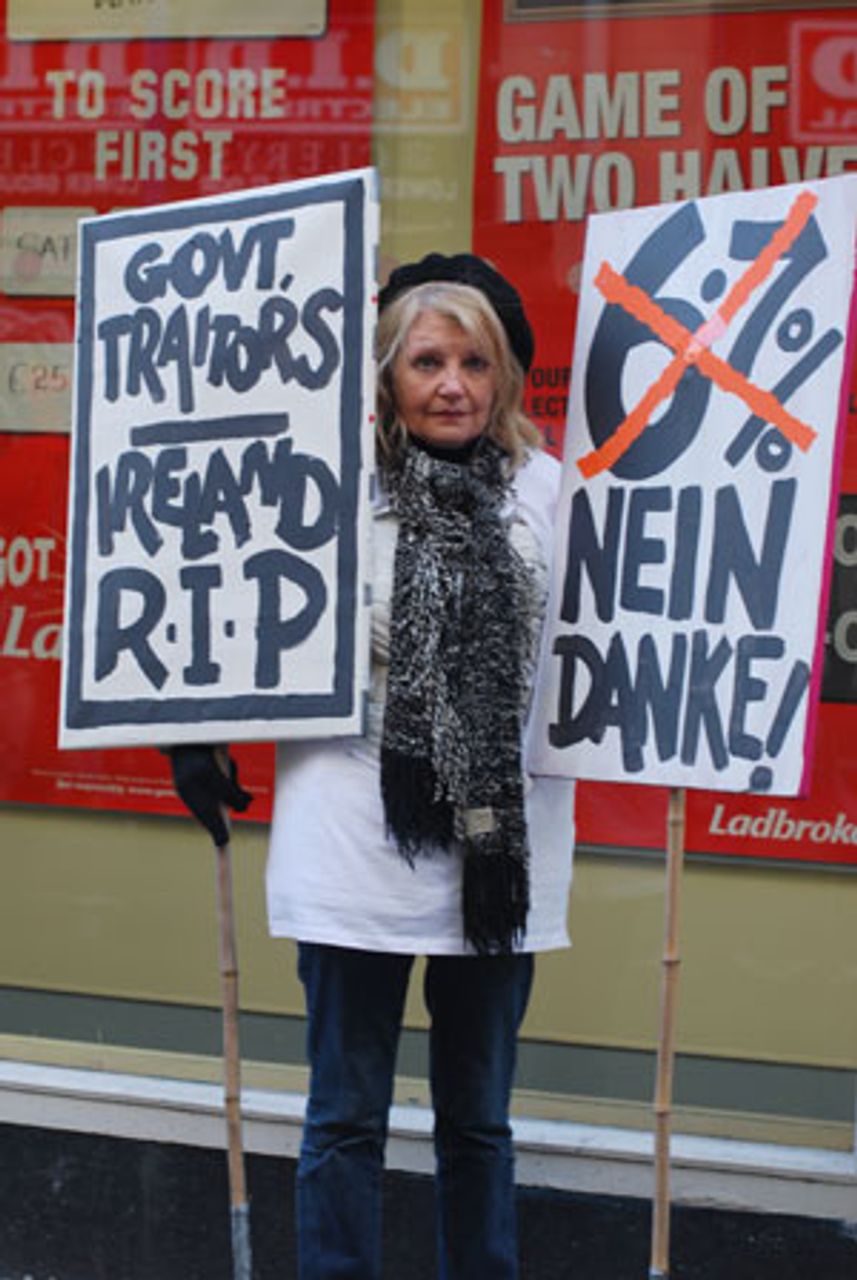 Irish workers march against bank bailout
Irish workers march against bank bailoutThe World Socialist Web Site interviewed a number of workers, students and academics at the November 27 Irish Congress of Trade Unions and outside Trinity College.
Michelle, a housewife, said, “I’m here today because I’m really angry that our government has sold us out, although I know they sold us out a long time ago. But today the bribers have become the oppressors and they are looking to turn Ireland into a third world country. I’m not having it. I’m not having my children starving on the streets because of the greed and corruption in the Irish government.
“Any time the IMF has gone into any country—look at Argentina—they turned people that had plenty into people that were starving. They gave away our oil, same as Fianna Fail gave away our gas field. I’m not putting up with it. I’m going to refuse to pay car tax, the TV licence, credit bills… The elite are driving the poor poorer, they want masters and peasants and I am not going to be anybody’s peasant.”
 Woman protests high interest rate imposed on Ireland
Woman protests high interest rate imposed on IrelandJohn O’Neil, who is unemployed from Leitrim, attended the anti-bailout demonstration. He said, “I spent two years in Australia and came back for some reason. I might have to leave again.
“If we took back our mining rights from the Catholic Church—there’s gold in Portpatrick—and lots of natural resources it would help. The Knock Ellen Basin has 97 billion barrels of oil equivalent reserves. It was first drilled in 1960, and back then it was too expensive to mine it. Now, as oil and gas prices are rising all over the world, we have our own stuff, so why are we paying for it? We could create employment in the North West of Ireland.
“I think it’s impossible to pay our debt. Look at the interest on the interest on the interest. We should forfeit the debt and let them come in with the soldiers. Or bring back the punt, get rid of the Anglo Irish Bank, get rid of the lot.”
Simon Malone, a building worker, said of the government and bankers, “Criminals in suits, that’s all they are. If it was anyone else on the street they’d be locked up, but these guys are still roaming free with big pensions. My two little girls are going to be paying for this in their adulthood and throughout their working life. We are putting money away to fund college fees for them already. What is it going to be like in 19 or 20 years time when they are going to college?
“There’s no difference between the parties, every one of them is the same. It’s a cartel, and it always has been. All that’s happened since independence is a mess. It’s just wealthy landowners and their sons that have got these political jobs and had a bit of money behind their family to front political campaigns. This is why they’re in power.
“They’re all ‘do as I say’ not ‘do as I do’ parties. They can do anything they want, but Joe Soap on the street and the middle and lower classes just mop up the mess. It’s not going to change with any of them. Labour are the same. They won’t commit to anything that will change the system.”
Simon added, “I can’t comment on other countries or on what the political structures are with local issues and government. But I know we were a fairly militant country. In the 1980s people would come out on the streets at the drop of a hat. The Celtic Tiger was the worst thing that ever happened. I know it came on the back of the 80s, when everybody had nothing. Then the work came in. I’m from a family of five and we had literally nothing. My father died when I was four years of age. He didn’t have a job. I was just lucky enough to have a job during the Celtic Tiger, but I wasn’t living it up. It was the rich that were doing that.
“That’s why this country is the way it is. It wasn’t Joe Soap finally getting a job, and changing a car on hire purchase or having a holiday that caused this. I’d like to think that workers united could do something. Everyone needs to stand together and challenge this culture of just accepting that you can’t change things. What you’re saying about uniting workers internationally would sit comfortably in my mind.”
Kieran, a student, said, “I think the bailout is completely wrong. I think we’re being bullied by Europe to shore up the banks there.
“Some people are afraid to protest and step outside the system, but I don’t think they have an alternative, regardless of the parties in the Dail. The bailout being signed and the budget being forced through, whoever comes into power, is going to be dealing with the same issues. I can’t see Labour or Fine Gael offering anything particularly unique. They might have some more growth strategies, but I don’t know how much growth they’re going to be able to develop when they’re required to cut €15 billion in three years.”
Kevin, a student, said, “I think the bailout is going to affect everyone, regardless. I come from an upper middle-class background, but I’m in financial difficulty and my family is in financial difficulty and I would honestly be afraid of whether I am going to college next year because of the registration fees.
“We have no option but to take the bailout, otherwise we will be in deeper trouble. But, it’s hard to not feel bitter about the mismanagement over the last few years.
“In the Irish crisis things have been made worse by Anglo Irish Bank and people like Sean Fitzpatrick, although there are feelings that this has been going on in all the banks. Fitzpatrick, people like him, the bankers and developers, should not have been bailed out in the first place. They were taking risks and the banks were taking crazy risks.
“There’s a disease or a domino effect going through Europe. It seems like the upper class are getting away with solving their own problems, while the working class are getting wages and social welfare cuts. Ireland has been passive compared to France or Greece, but that’s going to change. This will be the worst budget in history, and we’re in the worst state we’ve ever been.
“Irish people will become more political. The working class will stand up and demand to be counted. There have been strikes, but it doesn’t seem they’ve been listened to.”
Joe Smith, an environmental academic at Trinity, said, “I think the economic crisis in Ireland has been devolved by the global market and policies are being dictated by international market forces. This is going to end with a devastated and depleted country. Public sector workers are paying for the crisis caused by a carve-up between the bankers and the property developers. There will be fewer public workers, lower wages. I think it’s terrible that the Irish government’s hands are so constrained by the international system of finance, but they also helped cause it and are complicit in it, particularly with regard to the initial crisis.”
Dr. Shamas Salahim works with disadvantaged and homeless people in Dublin. He said, “It’s very unfortunate that we have come to this situation because of the sheer greed and selfishness of some politicians, who are in cahoots with the bankers and the builders.
“They are going after the people who are least able to afford it—the middle class and the lower class. They are asking us to pay a heavy price for their mischief, but they should set an example and take a big pay cut or contribute more. Hard working middle-class and working-class people, who are struggling to put bread on the table, should be able to breathe freely, and have some sort of arrangement to override this debt, which is going to go on for another 50 years.”
